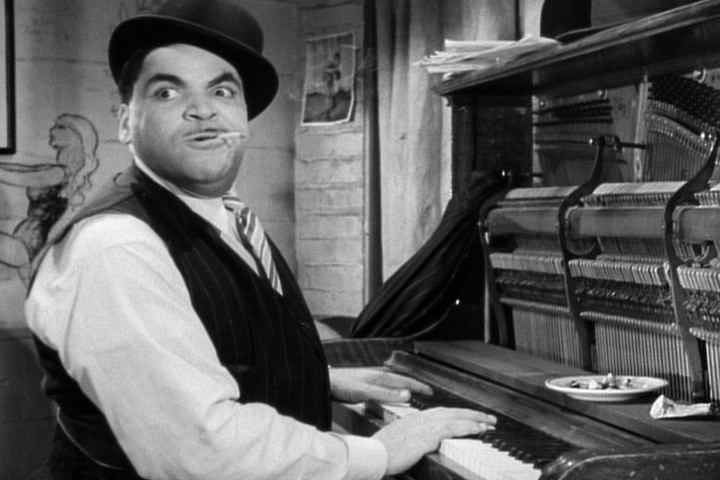
Tin Pan Alley Cats is a 1943 animated short subject, directed by Bob Clampett for Leon Schlesinger Productions as part of Warner Bros.' Merrie Melodies series. A follow-up to Clampett's successful Coal Black and de Sebben Dwarfs, released earlier in 1943, Tin Pan Alley Cats focuses upon contemporary themes of African-American culture, jazz music, and World War II, and features a caricature of jazz musician Fats Waller as an anthropomorphic cat. The short's centerpiece is a fantasy sequence derived from Clampett's black and white Looney Tunes short Porky in Wackyland (1938).
Like Coal Black, Tin Pan Alley Cats focuses heavily on stereotypical gags, character designs, and situations involving African-Americans. As such, the film and other Warner Bros. cartoons with similar themes have been withheld from television distribution since 1968, and are collectively known as the Censored Eleven. (source: Wikipedia)

The cartoon opens with a cat who resembles a Fats Waller caricature going out for a night on the town. He is about to go into a club when a street preacher warns him that he will be tempted with "wine, women and song" if he goes in. This, however, only excites the cat ("Wine women an' song? What's de motor wid dat?") who immediately runs in. At first, he enjoys the club, but he becomes so immersed in the music that he is carried "out-of-this-world" to a manic fantasy realm filled with surreal imagery (including caricatures of Adolf Hitler, Hideki Tojo and Joseph Stalin.) This world frightens him so much that, when he wakes up, he gives up his partying ways and joins the religious music group singing outside, much to their surprise. (Wikipedia)

Musician Fats Waller
The cartoon, Tin Pan Alley Cats, plays on the age-old African American dichotomous musical dilemma, between the secular and the spiritual. This phenomena of musical genre schizophrenia exists in the African American community forever. The constant pull and push of the secular and the spiritual music enriches African American music like nothing else. It gets cross-pollinated and reconfigured from "field hollers," "spirituals," "gospel," "blues," "swing," "jazz," "ragtime," "rhythm and blues," "hip-hop" and everything else in between.
We can view these sentiments as the "Fats Waller" cat visits the Kit Kat Klub, where he is tempted by wine, women and song. He has a choice to listen to the pious sermons and hymns of the Uncle Tomcat Mission, or go to the Kit Kat Klub. Therein lies the dilemma. The double position problem offering two possibilities of how the cat could spend his Saturday night, at the club (Kit Kat Klub's initials are KKK) or at church (the Uncle Tom church).
"Wine, women and song" are his temptations and he easily finds all three readily available at the Kit Kat Klub. A jazz version of "Nagasaki" gets so hot and makes him sing so high that it sends him "out of this world," straight to a Technicolor Wackyland, complete with Hitler, Stalin and Japanese enemies. Scared back to earth, he runs from the club to join the Uncle Tomcat Mission band for a rendition of "Dat Ol' Time Religion."
In part because of budget limitations and wartime shortages, several sequences borrow animation and audio recordings from earlier Schlesinger cartoons. From Friz Freleng's 1937 "products come to life" Merrie Melodies short, September In The Rain, the recorded performance of "Nagasaki" is re-used completely intact, and the "Fats Waller" cat, :Louis Armstrong: trumpeter, jitterbugging woman and the trio of singing bartenders are re-prurposed for this cartoon. Gags from the "out-of-this-world" sequence feature color-redrawn versions of characters and visuals (along with re-recorded audio segments) from Clampett's Porky in Wackyland.
Segments specifically created for the nightmare sequence (such as the "Rubber (musical) Band" made up of rubber bands) would resurface in Friz Freleng's 1949 color remake of Porky In Wackyland, Dough for the Do-Do.
This cartoon would be the last Warner Bros. theatrical cartoon produced by Leon Schlesinger to feature an all-black cast, excluding Chuck Jones' Inki cartoons.

- Merrie Melodies Theatrical Cartoon Series
- Leon Schlesinger Studios
- Characters: Fats Waller Cat, Adolf Hitler, Joseph Stalin, Japanese Enemies, Uncle Tom Mission Singers.
- Originally Released in 1943.
- Originally Released Theatrically.
- Running Time: 7:25 minutes.
- Color
- U.S.A.




Please share more like that.
ReplyDeletecat wine